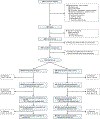Responsive parenting and Black mothers' postpartum sleep: Secondary analysis of a randomized controlled trial
- PMID: 38330306
- PMCID: PMC12346224
- DOI: 10.1037/hea0001363
Responsive parenting and Black mothers' postpartum sleep: Secondary analysis of a randomized controlled trial
Abstract
Objective: To determine if an intervention designed to enhance early responsive parenting (RP) practices (e.g., reading infant cues, establishing bedtime routines) and promote infant sleep and soothing among Black families has secondary benefits for mothers' postpartum sleep.
Method: This preregistered secondary analysis of the Sleep Strong African American Families randomized controlled trial investigated effects of an RP intervention versus a safety control condition on self-reported maternal sleep difficulties at 8 and 16 weeks postpartum and on actigraph-measured maternal sleep at 8 weeks postpartum.
Results: The 212 randomized mothers were Black/African American (100%) and non-Hispanic (98.6%) and averaged 22.7 years (SD = 4.5) of age. Among 138 mothers with useable actigraph data, RP mothers had a mean 20 [95% CI: 2, 37] minutes longer actigraph-measured total sleep time than controls at 8 weeks postpartum, after adjusting for age and other covariates likely to influence mothers' sleep (p = .04). Participation in the RP intervention did not significantly impact self-reported sleep difficulties or other actigraph-measured sleep parameters (e.g., efficiency) in either unadjusted or adjusted models, although RP effects on sleep difficulties and sleep efficiency were in the hypothesized directions.
Conclusions: Interventions supporting responsive sleep parenting practices to increase infant sleep may also help first-time Black mothers get more sleep themselves during the postpartum period, even without an explicit focus on maternal sleep strategies. (PsycInfo Database Record (c) 2024 APA, all rights reserved).
Objetivo:: Determinar si una intervención diseñada para mejorar las prácticas tempranas de crianza receptiva (RP, por sus siglas en inglés) (p. ej., leer las señales de los bebés, establecer rutinas a la hora de acostarse) y promover el sueño y la tranquilidad de los bebés entre las familias Negras tiene beneficios secundarios para el sueño posparto de las madres.
Métodos:: Este análisis secundario previamente registrado del ensayo controlado aleatorio Sleep SAAF (Strong African American Families) investigó los efectos de una intervención de RP frente a una condición de control de seguridad en las dificultades de sueño maternas autoinformadas a las 8 y 16 semanas posparto y en las mediciones de sueño materno a las 8 semanas posparto tomadas con actígrafos.
Resultados:: Las 212 madres asignadas al azar eran Negras/Afroamericanas (100%) y no hispanas (98.6%) y tenían un promedio de 22.7 años (DE = 4.5) de edad. Entre 138 madres con datos actigráficos utilizables, las madres RP tuvieron una media de 20 [95% IC: 2 a 37] minutos más de tiempo total de sueño medido con actígrafo que los controles a las 8 semanas posparto, después de ajustar por edad y otras covariables que probablemente influyan en el sueño de las madres ( p = .04). La participación en la intervención de RP no tuvo un impacto significativo en las dificultades de sueño autoinformadas u otros parámetros del sueño medidos con actígrafos (p. ej., eficiencia) en los modelos ajustados o no ajustados, aunque los efectos de RP sobre las dificultades y la eficiencia del sueño estuvieron en las direcciones hipotéticas.
Conclusiones:: Las intervenciones que apoyan las prácticas de crianza receptiva del sueño para aumentar el sueño infantil también pueden ayudar a las madres Negras primerizas a dormir más durante el período posparto, incluso sin un enfoque explícito en las estrategias de sueño materno.
Trial registration: ClinicalTrials.gov NCT03505203.
Figures

Similar articles
-
Effects of contextual stress on Black mothers' self-reported and actigraph-estimated postpartum sleep.Sleep. 2025 Jul 11;48(7):zsaf023. doi: 10.1093/sleep/zsaf023. Sleep. 2025. PMID: 40036969
-
Antiretroviral therapy (ART) for treating HIV infection in ART-eligible pregnant women.Cochrane Database Syst Rev. 2010 Mar 17;2010(3):CD008440. doi: 10.1002/14651858.CD008440. Cochrane Database Syst Rev. 2010. PMID: 20238370 Free PMC article.
-
Prescription of Controlled Substances: Benefits and Risks.2025 Jul 6. In: StatPearls [Internet]. Treasure Island (FL): StatPearls Publishing; 2025 Jan–. 2025 Jul 6. In: StatPearls [Internet]. Treasure Island (FL): StatPearls Publishing; 2025 Jan–. PMID: 30726003 Free Books & Documents.
-
Parent training interventions for parents with intellectual disability.Cochrane Database Syst Rev. 2018 Jul 13;7(7):CD007987. doi: 10.1002/14651858.CD007987.pub3. Cochrane Database Syst Rev. 2018. PMID: 30004571 Free PMC article.
-
Long-Term Effects of a Responsive Parenting Intervention on Child Weight Outcomes Through Age 9 Years: The INSIGHT Randomized Clinical Trial.JAMA Pediatr. 2025 Aug 1;179(8):827-835. doi: 10.1001/jamapediatrics.2024.6897. JAMA Pediatr. 2025. PMID: 40063048 Clinical Trial.
Cited by
-
Effects of a responsive parenting intervention on Black mothers' depressive symptoms postpartum: Secondary analysis of a randomized clinical trial.J Consult Clin Psychol. 2024 Dec;92(12):828-835. doi: 10.1037/ccp0000926. J Consult Clin Psychol. 2024. PMID: 39715425 Clinical Trial.
-
Unique contributors of contextual stress to Black mothers' sleep in the postpartum period.Sleep. 2025 Jul 11;48(7):zsaf106. doi: 10.1093/sleep/zsaf106. Sleep. 2025. PMID: 40249128 Free PMC article. No abstract available.
References
-
- Buysse DJ, Hall ML, Strollo PJ, Kamarck TW, Owens J, Lee L, Reis SE, & Matthews KA (2008). Relationships between the Pittsburgh Sleep Quality Index (PSQI), Epworth Sleepiness Scale (ESS), and clinical/polysomnographic measures in a community sample. Journal of Clinical Sleep Medicine, 4(6), 563–571. 10.5664/jcsm.27351 - DOI - PMC - PubMed
Publication types
MeSH terms
Associated data
Grants and funding
LinkOut - more resources
Full Text Sources
Medical

